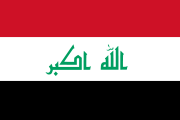Military dictatorship
| This article is part of the Politics series |
| Forms of government |
|---|
| List of government types |
|
| Politics portal |
A military dictatorship is a form of government where in the political power resides with the military. It is similar but not identical to a stratocracy, a state ruled directly by the military. Like any dictatorship, a military dictatorship may be official or unofficial, and as a result may not actually qualify as stratocratic. Mixed forms also exist, where the military exerts a very strong influence without being entirely dominant.
The typical military dictatorship in Latin America was ruled by a junta (derived from a Spanish word which can be translated as "conference" or "board"), or a committee composed of several officers, often from the military's most senior leadership, but in other cases less senior, as evidenced by the term colonels' regime, where the military leaders remained loyal to the previous regime. Other military dictatorships are entirely in the hands of a single officer, sometimes called a caudillo, usually the senior army commander. In either case, the chairman of the junta or the single commander may often personally assume office as head of state.
In the Middle East and Africa, military governments more often came to be led by a single powerful person, and were autocracies in addition to military dictatorships. Leaders like Idi Amin, Sani Abacha, Muammar al-Gaddafi, and Gamal Abdul Nasser worked to develop a personality cult and became the face of the nation inside and outside their countries.
Most military dictatorships are formed after a coup d'état has overthrown the previous government. One very different pattern was the one followed by Saddam Hussein's regime in Iraq and Kim Il-sung's regime in North Korea, both of which began as one-party states, but over the course of their existence turned into military dictatorships as their leaders donned uniforms and the military became closely involved in the government.
Conversely, other military dictatorships may gradually restore significant components of civilian government while the senior military commander still maintains executive political power. In Pakistan, ruling Generals Muhammad Zia-ul-Haq (1977-1988) and Pervez Musharraf (1999-2008) have held singular referendums to elect themselves President of Pakistan for additional terms forbidden by the constitution.
In the past, military juntas have justified their rule as a way of bringing political stability for the nation or rescuing it from the threat of "dangerous ideologies". In Latin America the threat of communism was often used, while in the Middle East the desire to oppose Israel and later Islamic fundamentalism proved an important motivating pattern. Military regimes tend to portray themselves as non-partisan, as a "neutral" party that can provide interim leadership in times of turmoil, and also tend to portray civilian politicians as corrupt and ineffective. One of the almost universal characteristics of a military government is the institution of martial law or a permanent state of emergency.
Although there are exceptions, military regimes usually have little respect for human rights and use whatever means necessary to silence political opponents, who are viewed as opposing the army as enemies. A military regime is also rarely willing to leave power unless forced to by popular revolt, whether active or imminent.
Latin America, Africa, and the Middle East have been common areas for military dictatorships. One of the reasons for this is the fact that the military often has more cohesion and institutional structure than most of the civilian institutions of society.
Military dictatorships can be contrasted with other forms of dictatorship. For example, in most current and historical Communist states, the center of power rests among civilian party officials, and very careful measures (such as political commissars and frequent rotations) are taken to prevent the military from exercising independent authority.
Since the 1990s, military dictatorships have become less common. Reasons for this include the fact that military dictatorships no longer have much international legitimacy, as well as the fact that many militaries having unsuccessfully ruled many nations are now inclined not to become involved in political disputes. Furthermore, the end of the Cold War and the collapse of the Soviet Union made it more difficult for military regimes to use the threat of communism as justification for their actions, or to gain support from foreign sources.
As the Cold War began to wind down, in the Middle East, regimes such as those of Syria and Egypt that were once clearly military dictatorships have switched to other forms of despotism.
Contents |
Current cases
 Burma (Myanmar) - since the 1962 Burmese coup d'état resulted in Ne Win seizing power; currently the Tatmadaw (armed forces) still lead under the auspices of the State Peace and Development Council; the country was also briefly led by the military from 1958 to 1960.
Burma (Myanmar) - since the 1962 Burmese coup d'état resulted in Ne Win seizing power; currently the Tatmadaw (armed forces) still lead under the auspices of the State Peace and Development Council; the country was also briefly led by the military from 1958 to 1960. Fiji - since the 2006 Fijian coup d'état; see also 1987 Fijian coups d'état and 2000 Fijian coup d'état.
Fiji - since the 2006 Fijian coup d'état; see also 1987 Fijian coups d'état and 2000 Fijian coup d'état. Guinea - since the 2008 Guinean coup d'état resulting in Moussa Dadis Camara seizing power.
Guinea - since the 2008 Guinean coup d'état resulting in Moussa Dadis Camara seizing power. Libya - since the 1969 Libyan coup d'état resulting in Muammar al-Gaddafi seizing power.
Libya - since the 1969 Libyan coup d'état resulting in Muammar al-Gaddafi seizing power. Niger - since the 2010 Nigerien coup d'état.
Niger - since the 2010 Nigerien coup d'état. North Korea - De facto since 1994, National Defence Commission of North Korea (proclaimed highest authority in 1998)
North Korea - De facto since 1994, National Defence Commission of North Korea (proclaimed highest authority in 1998)
Past cases
Note: due to the large number of historic regimes that could arguably be classed as military dictatorships, this list is limited to those administrations in power from the 19th century onwards.
Africa
 Algeria (1965-1978; 1992-1994)
Algeria (1965-1978; 1992-1994) Benin (1963-1964; 1965-1968; 1969-1970; 1972-1975)
Benin (1963-1964; 1965-1968; 1969-1970; 1972-1975) Burkina Faso (1966-1977; 1980-1991)
Burkina Faso (1966-1977; 1980-1991) Burundi (1966-1993; 1996-2003)
Burundi (1966-1993; 1996-2003) Central African Republic (1966-1979; 1981-1991; 2003-2005)
Central African Republic (1966-1979; 1981-1991; 2003-2005) Chad (1975-1979; 1982-1993)
Chad (1975-1979; 1982-1993) Comoros (1975-1976; 1978; 1999-2002)
Comoros (1975-1976; 1978; 1999-2002) Democratic Republic of the Congo (1965-1990)
Democratic Republic of the Congo (1965-1990) Republic of the Congo (1968-1979)
Republic of the Congo (1968-1979) Cote d'Ivoire (1999-2000)
Cote d'Ivoire (1999-2000) Egypt (1952-1970)
Egypt (1952-1970) Equatorial Guinea (1979-1987)
Equatorial Guinea (1979-1987) Ethiopia (1974-1987)
Ethiopia (1974-1987) The Gambia (1994-1996)
The Gambia (1994-1996) Ghana (1966-1969; 1972-1979; 1981-1993)
Ghana (1966-1969; 1972-1979; 1981-1993) Guinea (1984-1991; 2008-)
Guinea (1984-1991; 2008-) Guinea-Bissau (1980-1984; 2003)
Guinea-Bissau (1980-1984; 2003) Lesotho (1986-1993)
Lesotho (1986-1993) Liberia (1980-1984)
Liberia (1980-1984) Libya (1969-present)
Libya (1969-present) Madagascar (1972-1989)
Madagascar (1972-1989) Mali (1968-1991)
Mali (1968-1991) Mauritania (1978-1992; 2005-2007; 2008-2009)
Mauritania (1978-1992; 2005-2007; 2008-2009) Niger (1974-1989; 1996-1999; 2010-present)
Niger (1974-1989; 1996-1999; 2010-present) Nigeria (1966-1979; 1983-1989; 1993-1998)
Nigeria (1966-1979; 1983-1989; 1993-1998) Rwanda (1973-1991)
Rwanda (1973-1991) Sierra Leone (1967-1968; 1992-1996; 1997-1998)
Sierra Leone (1967-1968; 1992-1996; 1997-1998) Somalia (1969-1991; local militia rule since 1991)
Somalia (1969-1991; local militia rule since 1991) Sudan (1958-1964; 1969-1986; 1989-2000)
Sudan (1958-1964; 1969-1986; 1989-2000) Togo (1967-1991)
Togo (1967-1991) Uganda (1971-1979; 1980; 1985-1986)
Uganda (1971-1979; 1980; 1985-1986)
The Americas
 Argentina (1930-1932; 1943-1946; 1955-1958; 1966-1973; 1976-1983)
Argentina (1930-1932; 1943-1946; 1955-1958; 1966-1973; 1976-1983) Bolivia (1828-1848; 1861-1871; 1876-1880; 1930-1931; 1936-1943; 1951-1952; 1964-1966; 1969-1979; 1980-1982)
Bolivia (1828-1848; 1861-1871; 1876-1880; 1930-1931; 1936-1943; 1951-1952; 1964-1966; 1969-1979; 1980-1982) Brazil (1889-1894; 1964-1985)
Brazil (1889-1894; 1964-1985) Chile (1891-1896; 1924-1925; 1927-1931; 1973-1990)
Chile (1891-1896; 1924-1925; 1927-1931; 1973-1990) Colombia (1855-1857; 1953-1958)
Colombia (1855-1857; 1953-1958) Costa Rica (1863-1866; 1868-1876; 1877-1882; 1917-1919; 1948-1949)
Costa Rica (1863-1866; 1868-1876; 1877-1882; 1917-1919; 1948-1949) Cuba (1933-1940; 1952-1959)
Cuba (1933-1940; 1952-1959) Dominican Republic (1930-1961)
Dominican Republic (1930-1961) Ecuador (1876-1883; 1937-1938; 1963-1966; 1972-1979)
Ecuador (1876-1883; 1937-1938; 1963-1966; 1972-1979) El Salvador (1885-1911; 1931-1980)
El Salvador (1885-1911; 1931-1980) Guatemala (1944-1945; 1957-1958; 1963-1966; 1970-1986)
Guatemala (1944-1945; 1957-1958; 1963-1966; 1970-1986) Haiti (1950-1956; 1986-1990, 1991-1994)
Haiti (1950-1956; 1986-1990, 1991-1994) Honduras (1903-1907; 1956-1957; 1963-1971; 1972-1982)
Honduras (1903-1907; 1956-1957; 1963-1971; 1972-1982) Mexico (1884-1911)
Mexico (1884-1911) Nicaragua (1937-1956; 1967-1979)
Nicaragua (1937-1956; 1967-1979) Panama (1968-1989)
Panama (1968-1989) Paraguay (1940-1948; 1954-1993)
Paraguay (1940-1948; 1954-1993) Peru (1838-1872; 1876-1879; 1886-1895; 1914-1915; 1930-1931; 1933-1939; 1948-1950; 1962-1963; 1968-1980)
Peru (1838-1872; 1876-1879; 1886-1895; 1914-1915; 1930-1931; 1933-1939; 1948-1950; 1962-1963; 1968-1980) Suriname (1980-1988)
Suriname (1980-1988) Uruguay (1876-1879; 1981-1985)
Uruguay (1876-1879; 1981-1985) Venezuela (1908-1941; 1948-1958)
Venezuela (1908-1941; 1948-1958)
Asia
 Bangladesh (1975-1981; 1982-1986)
Bangladesh (1975-1981; 1982-1986) Burma (Myanmar) (1958-1960, 1962-present)
Burma (Myanmar) (1958-1960, 1962-present) Cambodia (1966-1967; 1969-1975)
Cambodia (1966-1967; 1969-1975) Republic of China (1928-1975; local militia rule 1912-1928)
Republic of China (1928-1975; local militia rule 1912-1928) Indonesia (1966-1998)
Indonesia (1966-1998) Iran (1953-1955)
Iran (1953-1955) Iraq (1933-1935; 1937-1938; 1949-1950; 1952-1953; 1958-1979)
Iraq (1933-1935; 1937-1938; 1949-1950; 1952-1953; 1958-1979) Japan (1932-1945)
Japan (1932-1945) North Korea (1994-present)
North Korea (1994-present) South Korea (1961-1979; 1980)
South Korea (1961-1979; 1980) Laos (1959-1960)
Laos (1959-1960) Pakistan (1958-1971; 1977-1988; 1999-2008)
Pakistan (1958-1971; 1977-1988; 1999-2008) Syria (1951-1954; 1963-1972)
Syria (1951-1954; 1963-1972) Thailand (1933-1945; 1946-1973; 1976-1988; 1991-1992; 2006-2008)
Thailand (1933-1945; 1946-1973; 1976-1988; 1991-1992; 2006-2008) Turkey (1960-1961; 1971-1973; 1980-1982)
Turkey (1960-1961; 1971-1973; 1980-1982) South Vietnam (1963-1975)
South Vietnam (1963-1975) North Yemen (1962-1978)
North Yemen (1962-1978)
Europe
 Bulgaria (1881-1883; 1934-1935; 1944-1946)
Bulgaria (1881-1883; 1934-1935; 1944-1946) France (1870-1871; 1940-1944)
France (1870-1871; 1940-1944) Greece (1922-1929; 1936-1941; 1967-1974)
Greece (1922-1929; 1936-1941; 1967-1974) Hungary (1944-1945)
Hungary (1944-1945) Poland (1926-1935; 1981-1983)
Poland (1926-1935; 1981-1983) Portugal (1917-1919; 1926-1933; 1974-1976)
Portugal (1917-1919; 1926-1933; 1974-1976) Romania (1940-1945)
Romania (1940-1945) Spain (1923-1930; 1939-1975)
Spain (1923-1930; 1939-1975) Turkey (1960-1961; 1971-1973; 1980-1982)
Turkey (1960-1961; 1971-1973; 1980-1982)
Oceania
 Fiji (1987; 2000; 2006-present)
Fiji (1987; 2000; 2006-present)
See also
- Police state
- Military government
- Khakistocracy
- Stratocracy
- Military rule
- Films depicting Latin American military dictatorships
- List of political leaders who held active military ranks in office
|
|||||||||||